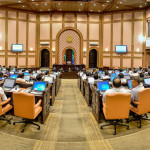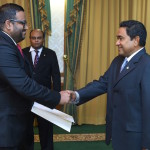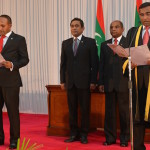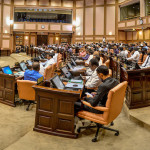The parliamentary committee selected to review the Rf11.9 billion ($US926 million) mid-term budget for 2010 has recommended increasing its size by seven per cent to Rf12.6 billion ($US1 billion)
Presenting the committee report last night Dhiggaru MP Ahmed Nazim, chairman of the 15-member ad hoc committee, said its tasks were divided to focus on government revenue, expenditure, the public sector investment programme (PSIP), civil servants’ pay and budgets of independent institutions.
“The policy followed by the budget committee was that the government has submitted the budget the way that they want, so we do not want to make any changes to the budgets of any government institutions,” he said. “The reason is because the government should have the right to govern in accordance with their policies.”
Independent institutions
But, he added, in their meetings the committee learned that independent institutions did not believe they had “any financial independence” as they required approval for expenditure from the finance ministry.
Furthermore, the committee was informed that the funds allocated in the budget would not be enough to pay wages for the employees of independent institutions next year.
“When they are summoned to Majlis for not fulfilling their legal responsibilities, they will say you didn’t even give us a budget,” he said.
The committee therefore recommended an increase of Rf166 million (US$13 million) for the budgets of independent institutions, with Rf142million (US$11 million) of it to be spent on salaries and allowances.
Of the Rf166 million, he said, Rf105 million (US$8 million) will go to the judiciary and the committee recommended allocating Rf15 million (US$1.6 million) from the PSIP budget to build a judicial complex for the department of judicial administration.
Civil servants
The committee further recommended an injection of Rf617.6 million (US$48 million) to the budget to restore civil servants’ salaries to their former levels.
In its negotiations with the Civil Service Commission before pay cuts were enforced in October, the government agreed to restore salaries once its revenue exceeded Rf7 billion (US$545 million).
Nazim said the finance ministry informed the committee that revenue will reach Rf7.3 billion next year.
Of the total government expenditure, 70 per cent was recurrent expenditure and 46 per cent was expenditure on salaries for employees.
“The ministry of finance and treasury revealed that salaries for state employees were not budgeted based on the number of state employees,” he said. “They said the finance ministry does not yet know the correct number of state employees. The reason is that an accurate database containing accurate information of employees receiving salaries from the government has not been established.”
Revenue
“The members decided that they support the privatisation policy, but the committee believes the government has not pursued it in the best way,” he said, adding MPs criticised the sale of the majority stake in Dhiraagu, the government telecommunication company.
While committee members expressed doubt that revenue could be generated from taxation as the necessary legislation had not been passed, Nazim said the committee recommended expediting the passage of legislation on levying GST (goods and services tax) on the tourism industry.
The government proposed a bill on GST to parliament last week.
But, the report states, MPs felt Rf300 million (US$23 million) in revenue from taxing corporate profits was unlikely to materialise in 2010 as administrative matters had to be worked out after the bills were passed.
The third and final readings of the corporate tax bill and tax administration bill has been tabled in the agenda for 28 December.
Expenditure
Nazim said the committee noted that expenditure on payment of loans was higher than previous years as a schedule had been formulated to repay government debt.
While Rf113 million (US$9 million) was allocated for reducing the cost of goods and services, he said, details of this item was not provided.
The committee took note of a significant decline in expenditure on education and health, said Nazim, with a decrease of Rf400 million (US$31 million) and Rf700 million (US$54 million) respectively.
Moreover, the funds designated for economic development projects was only 7.9 per cent of the total budget.
The committee recommended the inclusion of Rf50 million for fishermen and Rf4 million for private media as subsidies in the budget.
If the committee’s recommendations are passed, over Rf800 million will be added to the budget.
Among a further 17 recommendations by the committee were requiring the government to submit a report to parliament in June containing details of the projects to be carried out under PSIP.
Moreover, the government should submit details of its public private partnership (PPP) projects every six months.
Following voting on the amendments recommended by the committee and proposed by MPs during the final debate, the budget will be put for a vote tonight.






Dear Esteemed Members of Parliament
Some basic economics for you. The biggest problem for the country currently is to control inflation rates. This went ballistic since 2004 because the government spent more than it earns - primarily by printing new money. This meant too much Rufiyaa in circulation - which meant that you cannot keep dollar at 12.85 and actually GET any dollars from a bank.
So now you want to increase pay to the civil service.70% of the budget goes to recurrent expenditure and 40% of civil service pay.Note the civil service average pay has gone from 3000 MRF in 2004 to 11,000MRF today. They also get 70 days of leave a year (30 days annual leave, 10 days family leave, 30 days medical leave).
In 2006, the World Bank reported that if we continue spending the way we did, we would have to devalue the currency by 30%. Its now 2009 and we've had an economic crisis along the way. Our inflow of USD isn't much better.
So what you are signing is effectively a devaluation of the currency from MRF12.85 to about MRF16. This would mean all of our savings have effectively been depleted by 30% overnight! Inflation will simply jump up by more than 30% overnight. We will be close to total economic ruin!
Which is actually convenient for most of the opposition members out there because
a) your own personal wealth is in Singapore and Switzerland in USD or in hard assets such as property or resorts
b) any loss to the economy (and to the people of the country) can be blamed on the existing government thereby clearing the way for you to come and say that democracy does not work and we should have your old kingdom ways back!!!
For the sake of our fragile economy, I hope I'm wrong but I doubt it!!
I agree with Mark's comment. The amendments raises a series of question. It raises doubts about whos in-charge of state funds and expenditures.
Normally, parliament, having the stewardship role of the public, would question the numbers and priorities and question the revenues forecasts.
However, the Maldivian Parliament has effectively taken responsibility of the economy, by effectively proposing a new budget. Any screw up, of the economy will now be blamed on the Parliament.
It will be interesting to see how things unfold.
I agree with Malik on this. If the majlis takes on macroeconomic management aspects, they have to be responsible for the fallout as well. Even in the past Majlis set salaries of various entities without considering budgetary implications. Now they seem to be dodging the responsibility on them to facilitate the raising of revenues although everyone seems to accept that the country needs to diversify and increase the domestic revenue base - yet they are also suggesting increase in expenditure. I don't believe they can hold the government or the monetary authority responsible for macro management if they dictate on these kinds of issues. Judging by some of the discussion in the media and bills proposed, they seem to also want to set reserve levels and be responsible for all the debt that is taken on - soon we may have Majlis setting interest rates too. Perhaps the answer would be for both MMA and MOFT to shut shop and let the Majlis run the show.
Maldivians voted for a presidential system, but it appears as soon as Maumoon lost the Presidency, Pariliament seems to think that they are the ultimate authority on every damn thing. Wonder where this lot were during the last couple of decades?
This country is a joke now.
this is a country in this world that everything is unique.
The Parliament should stick to its job, making laws, and not meddle with the country's economy. They have already missed the Constitutional deadline to pass the de-centralization bill.
Q.Mark - Thank you for the most intelligent comment I've read on this site.
Rasheed - It is the government's job to set fiscal policy. If not them then who - the guy who serves me masuni?
On the issue of jobs I have to say there is a huge need for workers here. Maldivians complain about foreign workers but you know what? Foreign workers actually work. Most Maldivians I've hired are lazy as shi*t and just want to collect a pay cheque for taking 4 coffee breaks a day and 70 days of leave a year.